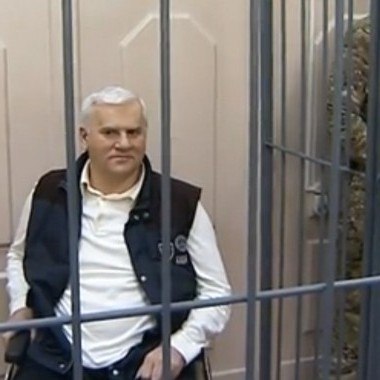Said Amirov, 59, the mayor of Dagestan’s capital Makhachkala was arrested on June 1, 2013, and accused of the murder of Arsen Gajibekov, the head of a district investigative committee. Ten more people have been arrested as accomplices, including Amirov's nephew.
Experts label Amirov as the second most powerful official in the North Caucasus, after the Chechen leader, Ramzan Kadyrov. Amirov has been the mayor of one of the most turbulent areas in the North Caucasus. He turned Makhachkala into a kind of totalitarian business empire gaining the nickname, “Dagestanian Luzhkov.” During his fifteen years in power, Amirov survived nine attempts on his life. He was injured and had to use a wheelchair, thus gaining another nickname, “Makhachkalian Roosevelt.”
Nonetheless, he was arrested by a potent law enforcement group that secretly arrived from Moscow with a military helicopter and an armored carrier. He did not resist, commented that he was surprised, and claimed there were political motives, even though he did not specify what kind.
The Federal Russian Investigative Committee released a statement that the case against Amirov had been under preparation for two years – though experts said that the arrest looked rather spontaneous, pointing out that officials did not even have time to find a proper acting mayor seeing as they appointed Amirov’s deputy (not the best choice considering his loyalties).
Amirov’s arrest took place less then half a year after the appointment of a new “acting president” of Dagestan, Ramazan Abdulatipov, who developed his career in Moscow without having strong ties to any Dagestan elites, thus everybody has been anticipating a clash between Abdulatipov and his allegedly more influential subordinate, the mayor of the republic’s largest city and capital. However, Abdulatipov’s role in the arrest of Amirov is not clear, with experts only being able to say that Amirov’s arrest could only have been sanctioned by top rung of the Russian power vertical.
Of late, the North Caucasus has witnessed a series of persecutions of local high-ranking bureaucrats. Three ministers were arrested in Nalchik a year ago by a special law enforcement group that secretly arrived from Moscow (the same way as Amirov was arrested). The former head of Dagestan, Magomedsalam Magomedov, was summoned to Moscow a half a year ago and was unexpectedly dismissed from his position. In March 2013, quite recently, Akhmed Bilalov, a federal-level businessmen close to the Kremlin and involved in the preparations for the 2014 Olympics went abroad after being suddenly criticized by President Vladimir Putin himself.
I asked Akhmet Yarlykapov, a senior scholar at the Institute of Ethnology and Anthropology of the Russian Academy of Sciences, who is originally from Dagestan, to comment on the significance of Amirov’s arrest. This is his analysis of the situation:
Amirov’s arrest is an important action by the federal center, on par with the dismissal of Magomedov and the appointment of Abdulatipov. It is a serious attempt to rearrange the Dagestan elite through the elimination of the most odious figures. Amirov was an extremely controversial figure, though he had been serving the Russian state earnestly (in his own way). Amirov was praised for organizing an irregular militia in 1999 to confront the invasion of Chechens in Dagestan lead by the terrorist Shamil Basaev. He also supported the Russian ethnic population in Dagestan and helped the Russian Orthodox Church, which is why he has so many awards, from the state and from the church. However, Amirov also strikingly represented the old political system, one that brought Dagestan to a deadlock, a system that included corruption, land distribution problems, economic issues, and the other usual aspects of stagnation. It was clear to the Kremlin that the new outsider, Abrulatipov, and the entrenched pillar of the Dagestani system, Amirov, could not co-exist. The catch is that Abdulatipov does not have the capability to deal with the old system on his own, he will need unconditional support from the federal center, which should act in a very precise and balanced way.
In short, as soon as Abdulatipov was appointed, it became clear that Amirov would not be able to get along with him and that one of them would have to leave. It took the federal center five months to figure out what to do, and with special forces and a military helicopter, they took Amirov (and other suspects) to Moscow. Much might change in Dagestan with Amirov gone. Most importantly, there has been removed the key man who interfered with the re-formatting the local elites. To date, the other main figures of the Amirov system are scared but not deprived of their power. They have influence and have not empowered Abdulatipov, which is why the federal center should act as fast as possible if it wants to achieve serious results. Actually, any delay with reforms and changes in Dagestan benefits the Amirov system. Moscow needs to establish direct management of the republic until Abdulatipov’s position improves. Further delays can let Amirov get some revenge. He still has extensive political connections and vast sums of money.
Sufian Zhemukhov is a Visiting Fellow at the Institute for European, Russian and Eurasian Studies (IERES), George Washington University, blogging for PONARS Eurasia on the Caucasus.









